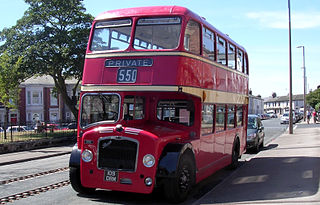Leyland Motors Limited was a British vehicle manufacturer of lorries, buses and trolleybuses. The company diversified into car manufacturing with its acquisitions of Triumph and Rover in 1960 and 1967, respectively. It gave its name to the British Leyland Motor Corporation, formed when it merged with British Motor Holdings in 1968, to become British Leyland after being nationalised. British Leyland later changed its name to simply BL, then in 1986 to Rover Group.

British Rail produced a variety of railbuses, both as a means of acquiring new rolling stock cheaply, and to provide economical services on lightly-used lines.

The Dennis Dart is a rear-engined single-decker midibus chassis that was introduced by Dennis Specialist Vehicles of Guildford, England in 1989, replacing the Dennis Domino. Initially built as a high-floor design, In 1996 the low-floor second generation Dennis Dart SLF was launched. In 2001, production of the Dart SLF passed to TransBus International, during which time it was sold as the TransBus Dart SLF; Alexander Dennis took over production in 2004, renaming the product as the Alexander Dennis Dart SLF.

The Dennis Dominator was Dennis's first rear-engined double-decker bus chassis, it was launched in 1977.

Optare is a British bus manufacturer based in Sherburn-in-Elmet, North Yorkshire. It is a subsidiary of Ashok Leyland.

Albion Motors was a Scottish automobile and commercial vehicle manufacturer.

The Leyland Titan was a forward-control chassis with a front-mounted engine designed to carry double-decker bus bodywork. It was built mainly for the UK market between 1927 and 1942, and between 1945 and 1969.

The Northern Counties Motor & Engineering Company was an English builder of bus and coach bodywork based in Wigan.

The Leyland Atlantean is a double-decker bus chassis manufactured by Leyland Motors between 1958 and 1986.

Boro'line Maidstone, previously Maidstone Borough Council Transport was a municipal bus operator in Maidstone and the surrounding villages. Maidstone Borough Council Transport was formed in 1974 from Maidstone Corporation Transport following local government reorganisation. In 1986 Boro'line Maidstone was formed as an arm's length company of Maidstone council from the operations of Maidstone Borough Council Transport. The company had a brief London operation. Following financial difficulties, the London operation was sold to Kentish Bus, and after a period of administration, the assets of the Maidstone operation was sold to Maidstone & District in 1992.

The Bristol Lodekka was a half-cab low-height step-free double-decker bus built by Bristol Commercial Vehicles in England. It was the first production bus design to have no step up from the passenger entrance throughout the lower deck, although Gilford and Leyland Motors had developed low floor city buses in the 1930s, these did not enter production.

The Leyland Leopard was a mid-engined single-decker bus and single-decker coach chassis manufactured by Leyland between 1959 and 1982.

Charles H Roe was a Yorkshire coachbuilding company. It was for most of its life based at Crossgates Carriage Works, in Leeds.

The Leyland Lynx was a stepped-entrance single-decker bus manufactured by Leyland in Workington, England between 1986 and 1992. After the takeover by Volvo, it was succeeded by the Volvo B10B.

The Daimler Fleetline is a rear-engined double-decker bus chassis which was built between 1960 and 1983.

The Leyland Tiger Cub was a lightweight underfloor-engined chassis manufactured by Leyland between 1952 and 1970.

The Leyland Panther Cub was a rear-engined single-decker bus manufactured by Leyland from 1964 until 1968.

The Bristol LH was a single-decker bus chassis built by Bristol Commercial Vehicles (BCV) in Bristol, England. Nearly 2,000 were built between 1967 and 1982 in a variety of sizes and body types, including some as goods vehicles.
The Leyland Royal Tiger PSU was an underfloor-engined bus and coach chassis manufactured by Leyland between 1950 and 1954.

























